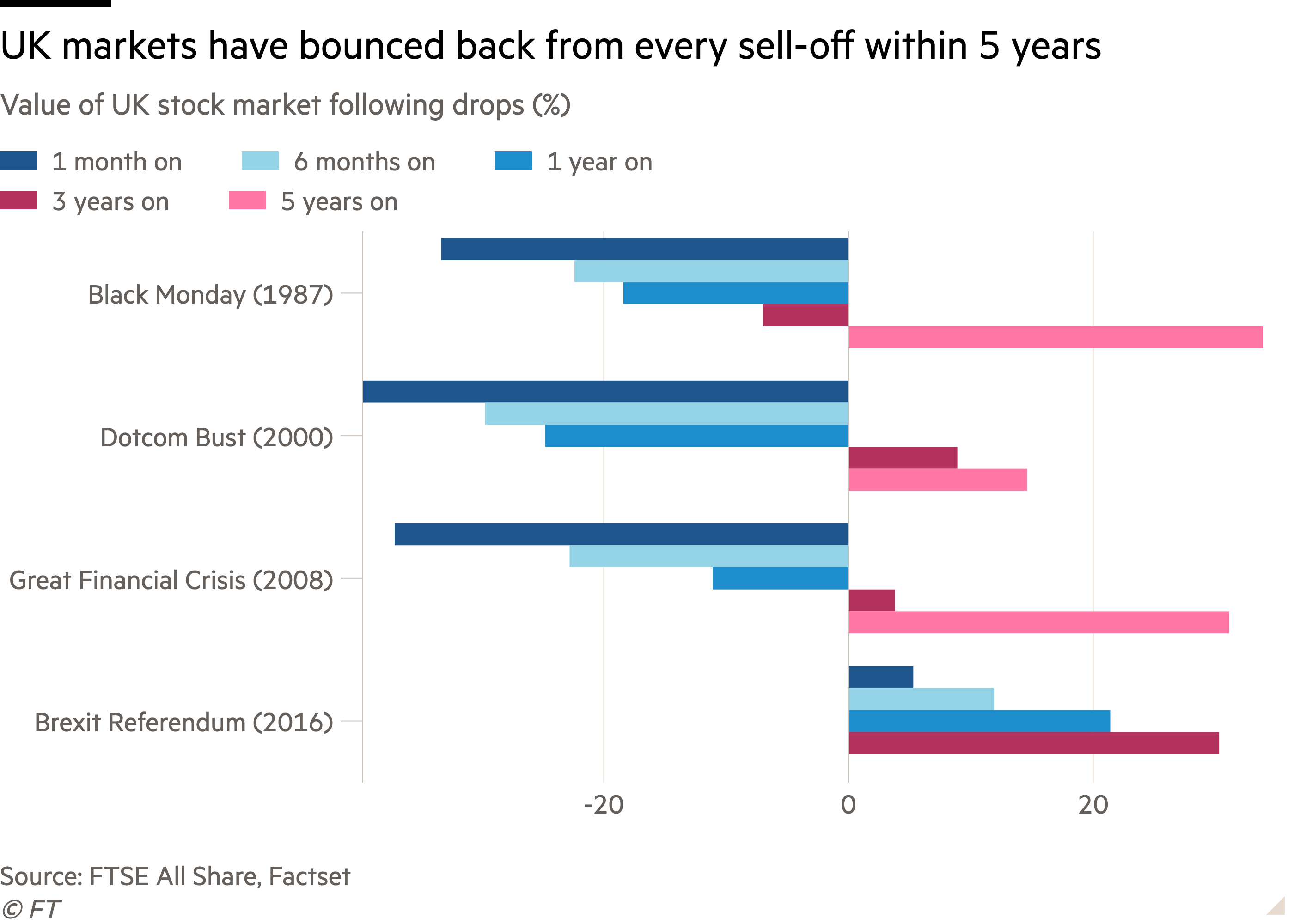2020 is not going well for investors. Anyone with money in a FTSE tracker is now holding an investment worth 31 per cent less than it was a month ago. The pain has been similar for those invested in the S&P 500 in the US. Specific sectors and stocks have endured an even sharper fall and many industries are facing a terrible few months as widespread isolation rattles major economies.
The pain is cutting especially deep as it has been so long since the stock market took a tumble of this scale. A decade of wonderful growth and momentum has made it appear easy to make money from the stock market, while a rise in cheap tracker funds and digital investment platforms has opened investing up to a broader audience than ever before.
Those who have entered the markets at some point in the last 10 years will be enduring their first major crash and the temptation might be to get out now and never go back. But sell-offs are a natural part of market behaviour. Indeed, they can provide huge opportunities for those with a steady head. Instead of scarpering, history suggests holding your nerve is likely to pay off, and for those who haven't yet made their first investment now might be a once-in-a-lifetime opportunity to get started.
Buy low, sell high
If markets are falling, why shouldn’t I move my money somewhere safer?
Selling during a sell-off is widely regarded as the most foolish course of action and a sure way of crystallising losses. Watching a share price fall is painful, but remember, you have only lost money once you have sold your shares. Unless you need a ready supply of cash immediately (and if you do, you probably shouldn’t have been in the stock market in the first place), you should not sell your shares while they are in free-fall.
The apparent safety of cash is also a myth. During a period where interest rates are lower than inflation, the real value of your cash is falling. Central bank interest rates have been cut to almost zero amid the economic challenges of the coronavirus outbreak and the returns you will be getting from the cash sitting in your bank is likely to be negligible. Unlike the stock market, cash is almost certain to lose real value in the next few months and years.
Why would I want to invest now when the stock market is so much more fragile than it was a few months ago?
First up, the fragility in global stock markets is not new, it has simply been exposed by the coronavirus crisis. Several years of easy growth have stretched valuations to unsustainable levels, especially in the US and a correction has been a long time coming. But it is true that the outlook for the individual companies which make up those stock markets is considerably worse now that coronavirus is disrupting supply and demand of goods and services around the world.
It is also true that things could get worse – much worse.
But they will also eventually get better. At no point in the history of either the British or US stock markets have prices been lower than they were 10 years previously. So, if you haven’t got any imminent need for your money, you can put it in the stock market and be confident that it will rise over the long term.
Data collected by investment group Hargreaves Lansdown shows that stock market corrections can provide an excellent opportunity to make your money go further. For example, if a saver doubled their monthly investment to £200 in each of the months that the FTSE All-Share dropped by more than 5 per cent, their portfolio would be worth 13 per cent more over the last 20 years than those who maintained a regular investment of £100. An investor who avoided the stock market completely in the months of difficultly would be sitting on a significantly smaller return.
Why not just wait to buy at the bottom?
There is no way of telling when the bottom of this rout will come and a huge range of factors will determine how long the crash will continue.
Chances are, we’re still some way from the bottom. The S&P 500 for example has only fallen to the level it was in late 2018 when the economic outlook was much healthier. Many individual stocks, especially in the tech space, are up over a six-month period and still don’t look especially cheap - clear evidence of how hype-driven the markets have been.
But there is no arguing with the fact that the markets as a whole are cheaper than they were a month ago and some individual sectors and stocks are significantly cheaper. Investors getting into the stock market now should be prepared to stomach some short-term pain as markets reach for the bottom, but it is better to get in early than miss the bottom completely.
That's because a huge proportion of the stock market's best days come immediately after the worst periods. Lots of studies have shown that being out of the market and missing the best trading days can significantly reduce long-term returns - in one case halving the return over a lifetime of investing.
5 tips for buying the bounce
1. Drip feed your portfolio
The best way of making money from the stock market is to be fully invested by the time the bottom is reached. As there is no way of knowing when the bottom will come, you should feed your portfolio with a small amount every month. If you’ve got more monthly disposable income now that you can’t go to out to restaurants, pubs or the cinema, use that to top up your investment portfolio regularly.
Remember the individual savings account (Isa) deadline at the start of April. Don’t miss out on your annual ISA allowance just because the markets are turbulent. You can fill your Isa with cash and drip feed it into equities over the following months.
2. Hunt for underlying quality
Quality companies with excellent profitability and a strong capacity for cash generation tend to bounce back well from big sell-offs. Look for companies that consistently generate a return on capital employed of over 20 per cent and free-cash-flow conversion of at least 80 per cent.
A strong balance sheet will also help companies through the challenges of a world in lockdown. The decline in consumer spending in the next few months will put huge pressure on companies’ cash flows. Those with a lot of debt will be in difficulty.
Buying funds or stocks simply because they are cheap is not the right thing to do. Investors should look for underlying quality before investing. That also means assessing the individual holdings in a fund before buying it and avoiding those that are full of low-quality companies.
This article can help you find quality shares in the rubble of a stock market in free-fall. And in this article, Algy Hall hunts for shares which are as cheap as they have ever been.
3. Look for genuine safe havens
In times of turbulence, investors often rush to perceived safe-haven assets, including gold, bonds and defensive equities. Indeed, the price of gold has rallied to within 8 per cent of its all time high in 2020, while falling treasury yields have pushed bond prices even higher.
Defensive stocks have not fared quite so well, especially in the UK where valuations were extraordinarily stretched prior to the sell-off. But the falling price of former defensive stocks doesn’t necessarily present investors with a buying opportunity. Many defensives are laden with debt which may prove problematic as cash flows come under pressure. A lot of these companies also pay their dividends out of that debt, which means a cut could be on the cards. Click here to find out more about why dividend payers are not necessarily defensive in this sell-off.
Bonds might also not be the safe havens they once were following the emergency interest rate cuts made by central banks around the world. But the Federal Reserve’s interest rate cut has increased the appeal of precious metals compared with US treasuries. It may also weaken the dollar and make gold more affordable, meaning the strong price increases seen in the last few weeks could have further to go.
4. Remember that forecasts probably aren’t correct
After the share price sell-offs of recent weeks, many stocks will be looking cheap on a price/earnings ratio (share price divided by forecast earnings). But for many companies those forecast earnings will probably be cut in the coming weeks.
Government intervention including the £330bn loan and contribution to workers’ salaries should help several companies manage the costs of the coming months, but that won’t help replace lost revenues. Companies in the retail, hospitality and travel sectors, among many others, are facing a sharp decline in revenues and profits, which will ultimately result in a big decline in earnings forecast. After cuts have been made, price/earnings ratios might not look so attractive.
5. Investment trusts are a good starting point
Investment trusts operate like funds in that they amalgamate investors’ money and a manager chooses the companies to invest in. But, unlike funds, investment trusts are traded on the stock market, which means their share prices move according to demand in the same way as stock share prices do.
When stock markets are falling, investment trust share prices tend to fall, too, but that fall might not reflect the value of the underlying assets. Discounts for investment trusts have been increasing since the start of the coronavirus outbreak, according to data from the Association of Investment Companies. Now could be a good time to bag some bargains.
This screen can help you identify Investment Trustr bargains amid the challenging times. And in this article, Dave Baxter has identified a range of investment trusts to help you weather this dividend drought.
To get the most out of the Investors Chronicle:
Choose a standard subscription - £38.75 per quarter by direct debit.
Choose an Alpha subscription - £68.75 per quarter by direct debit.
Our Alpha subscription is an additional service with longer analysis of companies and regular stock screens.











